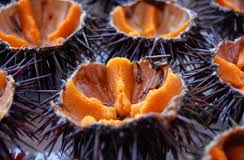Plenty of Fish in the Pugliese Sea

Most everything that used to intimidate me about living in Italy has long since faded away. Crowds of octogenarian dialect speakers, paying bills at the post office (yes, the post office) and disapproving grannies no longer provoke moments of intense self-doubt. After all, since we’ve been here, we’ve mounted our website by collaborating with a team of monolingual Italian techies, moved our bill-paying to online direct deposit and won grudging approval for appropriate seasonal vegetable selection among our neighborhood residents. But one frontier is still relatively uncharted, despite increasingly confident forays across its borders. One day I know we’ll stride confidently into our local pescheria and select our fish without anxiety. Based on our current performance, though, that day won’t be soon.
Puglia is surrounded by the sea, with over 400 miles of coastline on either side of Italy’s high-heeled boot. We live closest to the Adriatic, but make regular visits to the tranquil Ionian for long, lovely beaches and limpid, translucent water that stretches as far as you can see. All of this ocean makes for a seafood-crazed citizenry, with a staggering array of offerings from anguilla (eel) to the myriad choices for a proper zuppa di pesce (fish soup). As with most things culinary in Italy, everyone has an opinion and no one is afraid to share it with you.
So a trip to the fishmonger can be a trap for the unwary. First, the seafood: you can’t believe how much of it there is and how little you recognize as familiar. As we gaze at the tiniest of pesci azzurri (thin, little shiny fish no bigger than your index finger) to the almost prehistoric-looking rana pescatrice (monkfish), all preconceived plans are abandoned. We long to try something new, but often default to the baby pink local shrimp or a harmless fillet of sole in our indecision. Then there are the frutti di mare (shellfish) fairly brimming over their trays, the polipi (octopus) tentacles intertwined, reaching for the cozze (mussels) and the seppie (cuttlefish). The scene is both beautiful and deeply intimidating. And that’s just the fish. You should experience the group-shopping experience side-by-side with our neighbors on a Friday morning . . .
Our fishmonger is genial. He seems gifted with an intuitive sense about just how deeply we’re in over our heads. While other customers call our their orders and admonishments in our town’s incomprehensible dialect (“No, not that one! The other one, right there!”), he asks us gently what we want to cook, then steers us in the right direction. It doesn’t hurt that whatever we choose will be cleaned on the spot, the heads and shells reserved for making stock.
Now we’ve moved on from our fledgling efforts with fillet of sole to today’s thoroughly Pugliese Polipo in Pignata (octopus in an earthenware pot). All of my non-specific anxiety about octopus disappeared when we bit into the meltingly tender octopus, dipping our bread into the rich, oddly earthy brodetto (saucy broth) in the pot. We’ll hold our heads just a little higher in the fish market on our next trip, but I’m still a little weak in the knees around dialect speakers. Piano piano (slowly, slowly).

Saucy, flavorful octopus in its own broth is a low fat, high protein choice in the Mediterranean diet.
Should you come across some beautiful little octopus in your own fish market, here is a ridiculously simple recipe to boost your seafood confidence. It really is as easy as it looks. And octopus is a great source of protein with very little fat, making it a great Mediterranean diet choice. Many thanks to our fishmonger and Daniela Ardiri, a friend in nearby Monopoli who often shares her aunt Lucia’s recipes. Daniele serves her Polipo in Pignata over a smooth, satisfying puree of fava beans, but polenta or grilled country bread drizzled with extra virgin olive oil are also great accompaniments. Either way, you don’t want to miss a drop of the sauce.
Polipo in Pignata—Octopus in an Earthenware Pot
Ingredients:
2 lbs. of octopus (3 or 4 small octopus, each about the size of an outstretched hand)
3/4 lb. small tomatoes, cut in half or quarters if large
1 onion, chopped
2 cloves garlic, peeled and sliced
1/4 cup Italian parsley, roughly chopped
1 small, dried hot pepper (peperoncino)
Kosher or sea salt, to taste
Freshly ground black pepper, to taste
Extra virgin olive oi
Method:
If your fishmonger hasn’t cleaned your octopus for you, watch this video and tackle the process on your own. This is the most time-consuming element involved in making the dish and it’s pretty simple.
Next, place all of the ingredients except the olive oil in a terra cotta pot that is taller than it is wide. If you don’t have one of these, use any pot that is thick and retains heat well. Cast iron or a Le Creuset-style pot will work well, too. Be careful about how much salt you add; the octopus is already a little salty from the sea, which intensifies during cooking. Mix everything together with your hands, then pour a generous amount of extra virgin olive oil over the top. You may be tempted to add water, wondering how the ingredients will transform themselves into a rich, flavorful stew. According to Daniela’s aunt Lucia, however, o pulp se coce iend all’acqua soje (the octopus cooks in its own water). There’s some dialect for you.
Place the lid on the pot, then cook over a medium flame for about two hours. That’s it. Simple and simply delicious.
Serves 4 as a main course.










